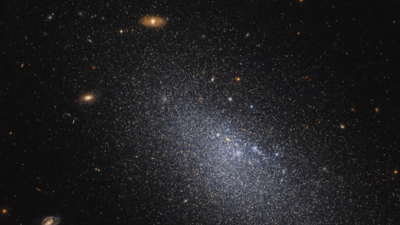
<p>Image source: NASA science</p><p><br><br></p><p>Read more at:<br><a href="http://timesofindia.indiatimes.com/articleshow/112656122.cms?utm_source=contentofinterest&utm_medium=text&utm_campaign=cppst">http://timesofindia.indiatimes.com/articleshow/112656122.cms?utm_source=contentofinterest&utm_medium=text&utm_campaign=cppst</a></p>
Nasa
's Hubble telescope has captured an image of a dwarf irregular galaxy
UGC 4879
, also known as the VV124. The galaxy is located just beyond the Local Group, about four million light-years from Earth.
UGC 4879 is an isolated
dwarf galaxy
. Because of its isolation, it is an interesting subject for astronomers who are investigating whether it might be an ancient, relatively undisturbed galaxy.
Some theories suggest that the earliest galaxies in the universe were low-mass dwarf galaxies, and if UGC 4879 is indeed a relic from the early universe, it could offer valuable insights into the formation and
evolution of galaxies
, galaxy clusters, and the broader cosmic structure.
Hubble telescope’s exceptional resolution allows the astronomers to observe individual stars and galaxies, even in the most crowded regions. This feature is crucial for determining the key characteristics of galaxies, such as distance, composition and age of the star.

 9 months ago
231
9 months ago
231




























 English (US)
English (US)